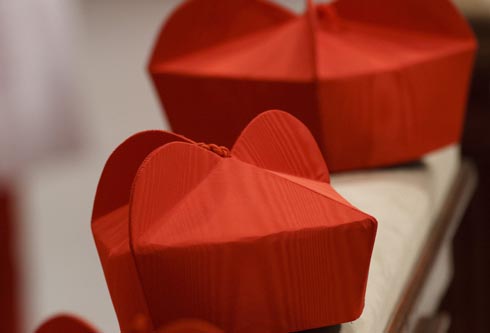From the Vatican news site:
After the Angelus on Sunday, Pope Francis announced the names of those who will be created Cardinals at the upcoming situation.
Below, please find the full text of the Holy Father’s announcement:
As was previously announced, on February 22, the Feast of the Chair of Peter, I will have the joy of holding a Consistory, during which I will name 16 new Cardinals, who, coming from 12 countries from every part of the world, represent the deep ecclesial relationship between the Church of Rome and the other Churches throughout the world.
The following day [February 23] I will preside at a solemn concelebration with the new Cardinals, while on February 20 and 21 I will hold a Consistory with all the Cardinals to reflect on the theme of the family.
Here are the names of the new Cardinals:
Pietro Parolin, Titular Archbishop of Acquapendente, Secretary of State
Lorenzo Baldisseri, Titular Archbishop of Diocleziana, Secretary General of the Synod of Bishops. Gerhard Ludwig Műller, Archbishop-Bishop emeritus of Regensburg, Prefect of the Congregation for the Doctrine of the Faith.
Beniamino Stella, Titular Archbishop of Midila, Prefect of the Congregation for the Clergy. Vincent Nichols, Archbishop of Westminster (Great Britain).
Leopoldo José Brenes Solórzano, Archbishop of Managua (Nicaragua). Gérald Cyprien Lacroix, Archbishop of Québec (Canada).
Jean-Pierre Kutwa, Archbishop of Abidjan (Ivory Coast). Orani João Tempesta, O.Cist., Archbishop of Rio de Janeiro (Brazil).
Gualtiero Bassetti, Archbishop of Perugia-Città della Pieve (Italy). Mario Aurelio Poli, Archbishop of Buenos Aires (Argentina).
Andrew Yeom Soo jung, Archbishop of Seoul (Korea). Ricardo Ezzati Andrello, S.D.B., Archbishop of Santiago del Cile (Chile).
Philippe Nakellentuba Ouédraogo, Archbishop of Ouagadougou (Burkina Faso). Orlando B. Quevedo, O.M.I., Archbishop of Cotabato (Philippines).
Chibly Langlois, Bishop of Les Cayes (Haïti).
Together with them, I will join to the Members of the College of Cardinals three Archbishops emeriti distinguished for their service to the Holy See and to the Church.
They are:
Loris Francesco Capovilla, Titular Archbishop of Mesembria.
Fernando Sebastián Aguilar, C.M.F., Archbishop emeritus of Pamplona.
Kelvin Edward Felix, Archbishop emeritus of Castries.
Let us pray for the new Cardinals, that vested in the virtues and the sentiments of the Lord Jesus, the Good Shepherd, they might be able to help more effectively the Bishop of Rome in his service to the universal Church.
From the Associated Press:
Sixteen of the appointees are younger than 80, meaning they are eligible to elect the next pope, which is a cardinal’s most important task. The ceremony to formally install them as cardinals will be held Feb. 22 at the Vatican.
Some appointments were expected, including that of his new secretary of state, the Italian archbishop Pietro Parolin, and the German head of the Vatican’s watchdog office for doctrinal orthodoxy, Gerhard Ludwig Mueller.
But some names were surprising.
Vatican spokesman the Rev. Federico Lombardi, said the pope’s selection of churchmen from Haiti and Burkino Faso, which are among the world’s poorest nations, reflects Francis’ attention to the destitute as a core part of the church’s mission.
For the first time since Blessed John Paul’s first class in 1979, no US prelate has made the cut, but that’s little surprise – as previously noted, the Stateside church’s traditional complement of cardinals is fully topped up, with none of the 11 electors from these shores set to turn 80 until 2015. For the Italian church, meanwhile, as reports in Rome have tipped for days, Papa Bergoglio has touched off yet another earthquake by passing over the heads of both the traditional “cardinalatial sees” of Venice and Turin, elevating in their stead Archbishop Gualtiero Bassetti, 72 – a figure said to more accurately reflect Francis’ identikit of a shepherd with the “smell of the sheep.” One of the three regional vice-presidents of the Italian bishops, Bassetti becomes the first Perugia prelate to be called to the College since the late 19th century.
And there’s this astute analysis from John Thavis:
First, Francis probably did not want to be seen as revamping the very institution that elected him only 10 months ago. If deeper changes are needed, they can easily come later in his pontificate.
Second, he may be convinced that a shift toward more pastoral leaders and fewer bureaucrats in the College of Cardinals is something that can be accomplished gradually. Over the next five years, he will have an opportunity to name at least 40 additional cardinals.
Third, the College of Cardinals may not be all that crucial to the reforms Pope Francis has in mind for the Vatican and the church at large. At present, a cardinal’s most important task is voting in a conclave. Although known as the church’s “Senate,” the cardinals really aren’t convened very often in Rome, and there is no indication Pope Francis plans to change that.
Being a cardinal does not by definition bring greater influence in most central church decisions. Traditionally, cardinals have dominated membership in Roman Curia agencies, but it remains to be seen if that will continue under Francis.












